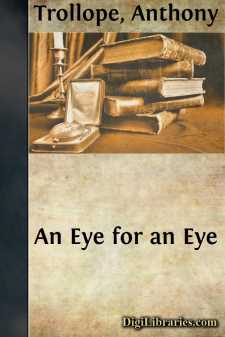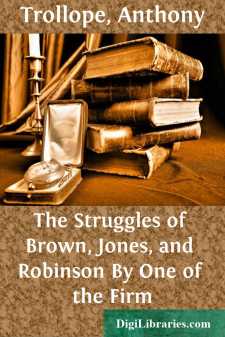Categories
- Antiques & Collectibles 13
- Architecture 36
- Art 48
- Bibles 22
- Biography & Autobiography 813
- Body, Mind & Spirit 142
- Business & Economics 28
- Children's Books 17
- Children's Fiction 14
- Computers 4
- Cooking 94
- Crafts & Hobbies 4
- Drama 346
- Education 46
- Family & Relationships 57
- Fiction 11829
- Games 19
- Gardening 17
- Health & Fitness 34
- History 1377
- House & Home 1
- Humor 147
- Juvenile Fiction 1873
- Juvenile Nonfiction 202
- Language Arts & Disciplines 88
- Law 16
- Literary Collections 686
- Literary Criticism 179
- Mathematics 13
- Medical 41
- Music 40
- Nature 179
- Non-Classifiable 1768
- Performing Arts 7
- Periodicals 1453
- Philosophy 64
- Photography 2
- Poetry 896
- Political Science 203
- Psychology 42
- Reference 154
- Religion 513
- Science 126
- Self-Help 84
- Social Science 81
- Sports & Recreation 34
- Study Aids 3
- Technology & Engineering 59
- Transportation 23
- Travel 463
- True Crime 29
Anthony Trollope
Anthony Trollope (1815-1882) was a prolific English novelist best known for his series of novels set in the fictional county of Barsetshire, including "Barchester Towers" and "The Last Chronicle of Barset." His works, often exploring the intricacies of Victorian society and politics, feature complex characters and detailed social commentary. Trollope also had a notable career in the British postal service, where he is credited with introducing the red pillar box (mailbox).
Author's Books:
Sort by:
by:
Anthony Trollope
INTRODUCTORY.—NUMBER ONE. I would that it were possible so to tell a story that a reader should beforehand know every detail of it up to a certain point, or be so circumstanced that he might be supposed to know. In telling the little novelettes of our life, we commence our narrations with the presumption that these details are borne in mind, and though they be all forgotten, the stories come out...
more...
by:
Anthony Trollope
THE RAY FAMILY. There are women who cannot grow alone as standard trees;—for whom the support and warmth of some wall, some paling, some post, is absolutely necessary;—who, in their growth, will bend and incline themselves towards some such prop for their life, creeping with their tendrils along the ground till they reach it when the circumstances of life have brought no such prop within their...
more...
by:
Anthony Trollope
Chapter I Julia Brabazon The gardens of Clavering Park were removed some three hundred yards from the large, square, sombre-looking stone mansion which was the country-house of Sir Hugh Clavering, the eleventh baronet of that name; and in these gardens, which had but little of beauty to recommend them, I will introduce my readers to two of the personages with whom I wish to make them acquainted in the...
more...
by:
Anthony Trollope
It is not true that a rose by any other name will smell as sweet. Were it true, I should call this story "The Great Orley Farm Case." But who would ask for the ninth number of a serial work burthened with so very uncouth an appellation? Thence, and therefore,—Orley Farm. I say so much at commencing in order that I may have an opportunity of explaining that this book of mine will not be...
more...
by:
Anthony Trollope
Introduction. At a private asylum in the west of England there lives, and has lived for some years past, an unfortunate lady, as to whom there has long since ceased to be any hope that she should ever live elsewhere. Indeed, there is no one left belonging to her by whom the indulgence of such a hope on her behalf could be cherished. Friends she has none; and her own condition is such, that she recks...
more...
by:
Anthony Trollope
PREFACE It may be well that I should put a short preface to this book. In the summer of 1878 my father told me that he had written a memoir of his own life. He did not speak about it at length, but said that he had written me a letter, not to be opened until after his death, containing instructions for publication. This letter was dated 30th April, 1876. I will give here as much of it as concerns the...
more...
by:
Anthony Trollope
CHAPTER I The troubles and sorrows of Linda Tressel, who is the heroine of the little story now about to be told, arose from the too rigid virtue of her nearest and most loving friend,—as troubles will sometimes come from rigid virtue when rigid virtue is not accompanied by sound sense, and especially when it knows little or nothing of the softness of mercy. The nearest and dearest friend of Linda...
more...
by:
Anthony Trollope
PREFACE. BY ONE OF THE FIRM. It will be observed by the literary and commercial world that, in this transaction, the name of the really responsible party does not show on the title-page. I—George Robinson—am that party. When our Mr. Jones objected to the publication of these memoirs unless they appeared as coming from the firm itself, I at once gave way. I had no wish to offend the firm, and,...
more...
by:
Anthony Trollope
CHAPTER I. THE REMNANTS OF THE AMEDROZ FAMILY. Mrs. Amedroz, the wife of Bernard Amedroz, Esq., of Belton Castle, and mother of Charles and Clara Amedroz, died when those children were only eight and six years old, thereby subjecting them to the greatest misfortune which children born in that sphere of life can be made to suffer. And, in the case of this boy and girl the misfortune was aggravated...
more...
by:
Anthony Trollope
There are men who cannot communicate themselves to others, as there are also men who not only can do so, but cannot do otherwise. And it is hard to say which is the better man of the two. We do not specially respect him who wears his heart upon his sleeve for daws to peck at, who carries a crystal window to his bosom so that all can see the work that is going on within it, who cannot keep any affair of...
more...











